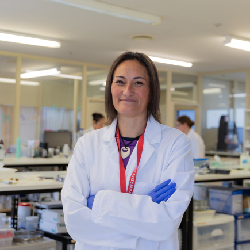Savannah Boere
Bachelor of Science (Technology)

Ngāpuhi, Te Rarawa, Ngāi Tūhoe, Whakatōhea
Master of Science, Doctor of Philosophy
Research & Enterprise Study Award

Qualification(s)
Subject(s)
Scholarship(s)
Kiri Reihana’s research at the University of Waikato in Tauranga is helping her reconnect with her heritage and ancestral roots.
A descendant of Ngāpuhi, Te Rarawa, Ngāi Tūhoe, and Whakatōhea tribes, Kiri's doctoral (PhD) research in Environmental Sciences on tuangi (cockles) in the Bay of Plenty’s Ōhiwa Harbour will help plan for the continued well-being of the harbour.
As a 50-year-old single mother of four, Kiri says her PhD isn’t just a personal endeavour.
“It’s for my people. It’s a sense of responsibility and I am only responding to where I need to be, contributing my skills and knowledge along the way.”
Born in Australia but raised in Auckland as the halfway point between her father's and mother's people in Kaikohe, in Northland and Whakatāne in the Bay.
Kiri’s love for the ocean stems from her childhood experiences when her parents would take her to the beach to collect pipis and cockles.
“Dad would cook them on a hotplate, we’d eat them on the beach and sleep on the way home. These memories fueled my research as they’re tied to the places I grew up.”
Kiri’s research, which maps the habitats, populations and evolution of cockles, feeds into the Sustainable Seas National Science Challenge - a $71.1 million initiative that aims to protect and enhance the marine environment in New Zealand.
She is collecting and creating information that can inform iwi and council decision-making through mātauranga Māori (Māori knowledge) and marine science.
“We are putting that data into a species distribution model that was developed by NIWA to predict optimal habitats for future cockle restorations. As well as identifying existing cockle habits and looking at additional surveying areas if required.
“This journey has been fantastic. I’ve been supported along the way with scholarships, which to me, is confirmation I’m where I’m meant to be.”
Kiri was awarded $5000 as part of the Bay Trust Kaitiakitanga Scholarship to support her PhD study at Waikato and was the first Māori PhD student to receive the L’Oréal-UNESCO for Women in Science mentoring fellowship in 2022.
Her commitment to research excellence was also acknowledged with the Research & Enterprise Study Award in 2021, 2022, and 2023, the Project Ignite Scholarship, and the School of Science Masters Research Scholarship during her Master of Science in Biological Sciences in 2013.
Kiri attended Rutherford College in Te Atatū before her mother sent her to a Catholic girls’ school after she was caught smoking.
“She hoped it would straighten me out, and maybe it did,” laughed Kiri. “The only thing I was good at in school was math and drawing, so naturally, I followed that path.”
In between travel, study and her family obligations, Kiri completed architecture and environmental sciences degrees.
“I was working full-time as an architectural graduate for an environmental architect in Auckland, sometimes working up to 80 hours a week while attending my environmental sciences degree.
“This was when I embraced my new pathway.”
Upon finishing her degree, Kiri received a scholarship to do environmental research on the Rena oil spill that occurred off the coast of Tauranga in 2011 and moved to Maketū to pursue her master’s at Waikato.
“I looked at the impact the oil spill had on kai (food). I went along the beaches to see how far the oil spread two years after and what remnants of oil were left in the environment.”
She worked for Manaaki Whenua - Landcare Research in Hamilton, where she gained valuable experience under the guidance of senior Māori environmental scientists such as Garth Harmsworth and Shaun Awatere, then eventually enrolled in her PhD in 2021.
As a single mum, “I just want to set a good example for my kids, we naturally enjoy the outdoors, especially being at the beach and there is a saying by Pā McGowan, ‘ka ora te whenua ka ora te tangata’, when the land (environment) is well, then our people are well.
“It’s the holistic perspective that we as Māori hold, about being at one with our environment, treating it with the kindness it deserves for it to sustain us.”

Qualification(s)
Subject(s)
Scholarship(s)
You’re currently viewing the website as a domestic student, you might want to change to international.
You're a domestic student if you are:
You're an International student if you are: